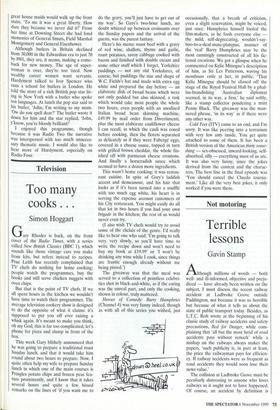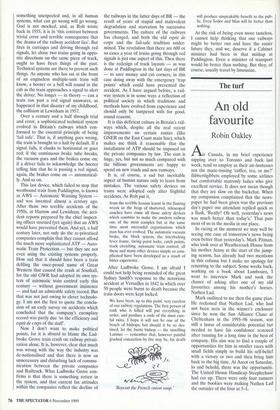Not motoring
Terrible lessons
Gavin Stamp Athough millions of words — both well- and ill-informed, objective and preju- diced — have already been written on the subject, I must discuss the recent railway accident at Ladbroke Grove outside Paddington, not because it was so horrible but because of what it tells us about the state of public transport today. Besides, as L.T.C. Rolt wrote at the beginning of his classic study of railway accidents and safety precautions, Red for Danger, while com- plaining that 'all but the most lurid of road accidents pass without remark' while a mishap on the railways always makes the papers, 'such publicity is, in part at least, the price the railwayman pays for efficien- cy. If railway accidents were as frequent as road accidents they would soon lose their news value.'
The collision at Ladbroke Grove must be peculiarly distressing to anyone who loves railways as it ought not to have happened. Of course, an accident by definition is something unexpected and, in all human systems, what can go wrong will go wrong. God is not mocked, and, as Rolt wrote back in 1955, it is in this contrast between trivial error and terrible consequence that the drama of the railway accident lies'. But fires in carriages and driving through red signals, let alone two trains going in oppo- site directions on the same piece of track, ought to have been things of the past. Technical systems are there to prevent such things. As anyone who has sat at the front of an engineless multiple-unit train will know, a hooter or a bell will sound in the cab as the train approaches a signal to alert the driver. No longer — in theory — can a train run past a red signal unawares, as happened in that disaster of my childhood, the collision at Lewisham in 1957.
Over a century and a half through trial and error, a sophisticated technical system evolved in Britain's railways which con- formed to the essential principle of being `fail safe'. That is, if anything goes wrong, the train is brought to a halt by default. If a signal fails, it clunks to horizontal or goes red; if the continuous brake tube breaks, the vacuum goes and the brakes come on; if a driver fails to acknowledge the hooter telling him that he is passing a red signal, again, the brakes come on — automatical- ly. And so on.
This last device, which failed to stop that westbound train from Paddington, is known as AWS — Automatic Warning System and was invented almost a century ago. After those two terrible accidents of the 1950s, at Harrow and Lewisham, the acci- dent reports prepared by the chief inspect- ing officer stressed (yet again) that an AWS would have prevented them. And yet, a half century later, not only do the re-privatised companies complain that they cannot afford the much more sophisticated ATP — Auto- matic Train Protection — but they are not even using the existing systems properly. How sad that it should have been a train defiling the once-proud name of Great Western that caused the crash at Southall, for the old GWR had adopted its own sys- tem of automatic train control early this century — without govemment insistence — and had an admirable safety record. But that was not just owing to clever technolo- gy. I am not the first to quote the conclu- sion of an early survey on accidents which concluded that the company's exemplary record was partly due `to the efficiency and esprit de corps of the staff'.
Now I don't want to make political points, for it is absurd to blame the Lad- broke Grove train crash on railway privati- sation alone. It is, however, clear that much was wrong with the way the industry was de-nationalised and that there is now an unnecessary and disturbing lack of commu- nication between the private companies and Railtrack. What Ladbroke Grove con- firms is that there is something rotten in the system, and that current lax attitudes within the companies reflect the decline of
the railways in the latter days of BR — the result of years of stupid and malevolent degradation and starvation by successive governments. The culture of the railways has changed, and both the old esprit de corps and the fail-safe tradition under- mined. The revelation that there are 600 or so cases a year of trains going through red signals is just one aspect of this. Then there is the redesign of track layouts -- as was done at Paddington in the last days of BR — to save money and cut corners, in this case doing away with the emergency 'trap points' which could have prevented the accident. As I have argued before, a rail- way system is in some ways a reflection of political society in which traditions and methods have evolved from experience and should only be tampered with for good, sound reasons.
It is this deficient culture in Britain's rail- ways which, despite all the real recent improvements on certain routes (like GNER on the East Coast main line), which makes me think it reasonable that the installation of ATP should be imposed on the private companies by law. The cost is huge, yes, but not so much compared with the billions governments are happy to spend on new roads and new runways.
It is, of course, a sad but inevitable aspect of human nature only to learn from mistakes. The various safety devices on trains were adopted only after frightful accidents. As Rolt put it,
from the terrible lessons learnt in the flaming wreck or the heap of shattered, telescoped coaches have come all those safety devices which combine to make the modern railway one of the most complex but at the same time most successful organisations which man has ever evolved. The automatic vacuum brake, the block system, the interlocking lever frame, facing point locks, catch points, track circuiting, automatic train control, all these and many other devices simple or com- plicated have been developed as a result of bitter experience.
After Ladbroke Grove, I am afraid I could not help being reminded of the great Sydney Smith's response to the notorious accident at Versailles in 1842 in which over 50 people were burnt to death because the train doors were kept locked.
We have been, up to this point, very careless of our railway regulations. The first person of rank who is killed will put everything in order, and produce a code of the most care- ful rules. I hope it will not be one of the bench of bishops; but should it be so des- tined, let the burnt bishop — the unwilling Latimer — remember that, however painful gradual concoction by fire may be, his death
'Boycott the French onion soup.'
will produce unspeakable benefit to the pub- lic. Even Sodor and Man will be better than nothing.
At the risk of being even more tasteless, I cannot help thinking that our railways might be better run and have the rosier future they, and we, deserve if a Cabinet minister had been in that mishap at Paddington. Even a minister of transport would be better than nothing. But they, of course, usually travel by limousine.



























































































 Previous page
Previous page